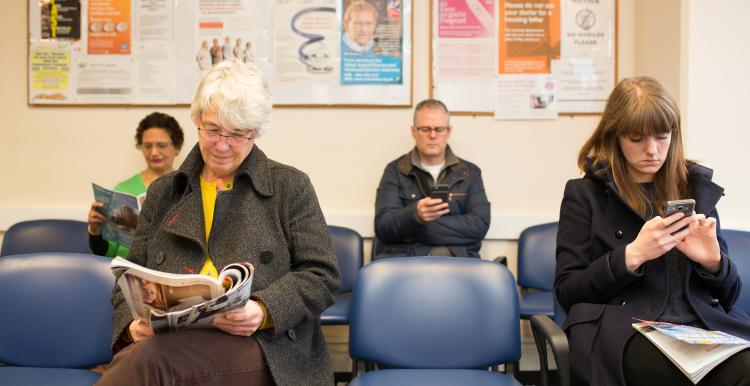Protections on NHS letter delivery agreed between Royal Mail, NHS leaders and patient bodies

This month Royal Mail, NHS England, NHS Providers, Healthwatch England, National Voices, and the Patients Association have written an open letter to Ofcom highlighting the introduction of new protections to ensure reliable and efficient postal service for NHS patients.
The postal regulator has today closed its public consultation to reform the universal postal delivery service, with changes to be announced this summer.
Since the beginning of the consultation, we have worked with Royal Mail and NHS and patient organisations to ensure that proposed changes improve timely delivery of NHS letters.
The improvements include:
- A new Royal Mail NHS-specific barcode to support mail delivery teams ensures that NHS letters are delivered on time, including at times of service disruptions. Once implemented, the barcode will replace manual extraction of NHS letters and be used to locate NHS letters where Royal Mail is not meeting expected delivery standards.
- A new briefing for NHS organisations to increase awareness and uptake of the variety of Royal Mail services for the timely delivery of NHS letters.
Last year, NHS and patient groups raised their concerns with Royal Mail and Ofcom following plans to delay bulk mail of NHS appointment letters last year.
In the open letter, the health leaders, joined by Royal Mail, have shared how they have worked together to meet the needs of the public and the NHS, as well as pledging to ensure that any future reform reflects the needs of the NHS and patients.
Emma Gilthorpe, Chief Executive, Royal Mail:
“We understand the vital importance of NHS letters to all our customers. We have put the needs of the NHS at the heart of our Universal Service reform proposals, ensuring we can deliver a range of service options for appointments and results sent by GPs surgeries, NHS bodies and hospitals across the country. We have also been working with NHS providers and patient groups to ensure the timely delivery of identifiable medical letters and welcome the truly collaborative approach taken.”
Saffron Cordery, Interim Chief Executive of NHS Providers:
“NHS trusts know the important role that letters play in patient care. It’s important that letters reach people on time so they aren’t missing appointments or at risk of losing their place in the queue for care, and not everyone can go online or has a smartphone. By working together we can make changes that meet the needs of patients and the NHS, including cutting trusts’ costs at a time when budgets are stretched to the limit.”
Lousie Ansari, Chief Executive at Healthwatch England:
“We have been delighted to work with Royal Mail and other health partners to make sure that people’s experiences of delayed letters have been listened to and addressed. Delayed delivery of letters is a frustrating admin issue people share with us. Recent research shows that 1 in 5 people received an invitation to an appointment by letter or text after the date of their appointment [3].
“Whether missing important appointments or vital test results, letters arriving late can be a patient safety risk, and often puts the burden on people to chase essential communications themselves. We hope these changes lead to improvements for patients and NHS teams.”
Rachel Power, Chief Executive of the Patients Association:
"For some patients, receiving timely written correspondence is extremely important to their care experience. When information flows as it should between patients and healthcare providers, it creates the foundation for genuine shared decision-making and more effective, safer care that works for all patients. We're committed to ensuring patients receive important health information in the way that works for them without delay. When patients and providers can communicate effectively and reliably, everyone benefits from safer, more personalised care."
Jacob Lant, Chief Executive, National Voices:
“It’s vital that patients can chose how best to communicate with the NHS and for many postal letters are essential to how they do that, especially for those that may struggle to understand or access online alternatives such as the NHS app.
“We know this Government is committed to reducing elective waiting times equitably and yet basic admin errors like delayed post can have a huge impact on whether this can be achieved. People with caring responsibilities, facing transport difficulties or with inflexible work roles need time to plan how to attend an appointment, so we hope this change in how Royal Mail manages NHS post will reduce the number of times patients hear about appointments or treatment when it is too late to attend.”
Open letter to Dame Melanie Dawes, Chief Executive, Ofcom
April 10 2025
Dear Ms Dawes,
As Ofcom consults on proposals to reform the universal postal service, Royal Mail, NHS England, NHS Providers, Healthwatch England, National Voices and the Patients Association are writing to set out how we have been working together to ensure that any changes do not lead to worse outcomes or experiences for patients, and that the needs of the public and NHS organisations are met.
Reform of the universal service
Reform of the universal service The Ofcom consultation sets out why change is needed to modernise the postal service whilst protecting the choice of price, speed and reliability for everyone across the country. Alongside reforms to protect the financial sustainability of the universal service, Royal Mail is also working to drive improvements in quality and reliability of services to meet the needs of all postal users.
The importance of NHS letters
There is an increasing move towards digital NHS communications via email, texts, telephone or the NHS App. However letters remain crucial, particularly for those who may be digitally excluded for a variety of reasons.
The late delivery of NHS letters puts people at risk of missing important test results, time-critical appointment information, and any last minute changes to their appointments. Along with patient safety risks, missed appointments are costly to the NHS and disrupt the delivery of care to other patients.
While we recognise that public feedback to Healthwatch England, National Voices and the Patients Association highlights experiences of people in England not being sent important NHS correspondence in a timely fashion, we also want to set out the work being done to deliver for the NHS and patients.
Delivering for the NHS and patients
Since Ofcom published its call for input on the future of the universal postal service in January 2024, we have been working together to understand the impact of the proposed reforms to the postal service and to ensure that these changes deliver for the NHS and patients. NHS organisations use a wide variety of postal services, with no standardised approach. Royal Mail and the NHS have therefore been working together to ensure NHS organisations continue to have a choice of both price and speed when sending letters, and to improve how NHS letters are sent to patients across the UK.
Reliability is of vital importance to NHS providers and patients, and whilst all mail is important, not all is urgent. NHS providers recognise that they must ensure they are sending patients’ post out within the right timeframe and it is up to them to determine what service they use to enable that.
To help with this, NHS England and NHS Providers have produced guidance for NHS organisations, including a case study, to increase awareness and uptake of the variety of Royal Mail services for the timely delivery of NHS letters.
We are also pleased to announce that we have mutually agreed the introduction of a new Royal Mail NHS-specific barcode. Where Royal Mail quality of service performance targets are not being met, this barcode will mitigate the impact on NHS letters by helping to optimise their delivery at times of local and national disruption.
Next steps
Ofcom has set out its regulatory process on universal service reform, with a decision expected in summer 2025.
While we are not pre-empting any decisions Ofcom may make, we, the undersigned, will continue to look at ways to improve how we work together to ensure that any reform reflects the needs of the NHS and patients.
Our priority remains that NHS patients receive their post on time and ensuring the NHS has a choice of price and speed of delivery.
Yours sincerely,
Emma Gilthorpe, Chief Executive, Royal Mail
Chris Hopson, Chief Strategy Officer, NHS England
Saffron Cordery, Interim Chief Executive, NHS Providers
Louise Ansari, Chief Executive, Healthwatch England
Jacob Lant, Chief Executive, National Voices
Rachel Power, Chief Executive, The Patients Association
Cc. Wes Streeting MP, Secretary of State for Health and Social Care
Jonathan Reynolds MP, Secretary of State for Business and Trade
Share with us your experience on receiving NHS letters.
Take 5 minutes to share your feedback with us about receiving NHS letters. Have they arrived late? Or do yours always arrive in plenty of time?


